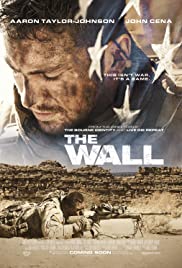
THE WALL
US, 2017, 88 minutes, Colour.
Aaron Taylor Johnson, John Cena, Laith Nakli.
Directed by Doug Liman.
To describe The Wall as a war film does not quite do it justice. It is, but it is not an action show that many audiences were expecting.
The date is 2007. Information is given that the war in Iraq is winding down, that George Bush had declared victory. An explanation is given that outside companies have been brought in to reconstruct Iraq but that they are set upon and personnel and security killed by insurgents, with the need for the American military to remain present in the country.
The film is of interest with the 2017 perspective on 2007 given the subsequent history of Iraq, conflict in Middle Eastern countries.
The film has a very short running time, 88 minutes. It has two American soldiers as characters and one insurgent sniper who is not seen but whose voice is heard.
The film action takes place over two days, the two Americans with camouflage in scrub in the desert, observing the aftermath of a massacre of security and working personnel, the bodies still lying in the sun, the vehicles abandoned. We know practically nothing about the two Americans – although, the central character, Isaac (Aaron Taylor Johnson) does have some moments in a verbal flashback which has its tragic revelations and consequences.
The two Americans compare notes, one deciding to go out and check what has happened – with dire results.
The Wall of the title has been built of local bricks, part of it has been demolished by gunfire, and the rest is in a fairly dilapidated state, yet providing some shelter for Isaac, though a target for further demolition by the unseen but heard Juba, who fires at the wall making it more difficult for Isaac to shelter.
Isaac is stranded, night and another day, Isaac trying to use his wits to survive, trying to communicate to headquarters but finding that Juba is on the other end of the line, leading to interactions, discussions, taunts, psychological pressure, and quotations from Edgar Alan Poe.
In watching the film, the audience, uncertain as to how it will eventuate, on side with the stranded American, wondering whether there will be a final charge by the cavalry to rescue him, it is something of an endurance despite its short running time.
The audience will leave the theatre in something of a grim mood, much more conscious in 2017 of the complexities of wars in Iraq and Afghanistan, the lack of traditional warfare as might be remembered or is in the movies from World War II, questioning the involvement of American overseas troops and yet the continued puzzles of how situations can be bettered.
1. A war film? Focus on one situation? Two American soldiers? The Iraqi sharpshooter? More a psychological study rather than an action show?
2. Iraq, 2007, the war winding down, Bush’s declaration of victory? The reconstruction of the country? The outside companies coming in for reconstruction? The attacks by local insurgents? The role of the US military?
3. The location, the desert, the sun and the wind, the snipers hiding in the scrub, the sniper hiding in the rubbish tip, the pipe, the dead men and their vehicles?
4. The focus on the two characters? Matthews, his strong presence, being wounded? Isaac, the experience, the drama resting on him? The discovery of the sniper, his action, the deaths? The communication with Isaac? The buildup to a culmination, Matthew’s attempt to shoot, his death? Isaac surviving, talking, the arrival of the helicopters?
5. Matthews, strong character, the surveillance, not seeing anything, communication with Isaac? His going down to inspect, the dead men, bullets to the head? His suspicions? Being wounded? Lying in the dust, bleeding, talking with Isaac, Isaac urging the use of the tourniquet? Bleeding, presumed dead? His later coming to consciousness, the mirror, Isaac communicating, his slowly reaching out for the rifle, his shot, his being killed?
6. Isaac, no major background, talk about Dean’s rifle? And the later verbal flashback of why Isaac did not want to return, the blunder, the killing of Dean? His lies in exonerating himself?
7. Isaac, undercover, coming into the open, checking on Matthews, Isaac being shot, his leg wound, treating it? The radio failing? Taking cover with the wall? Making the hole, using his sights? The realisation that the shooter was in the rubbish dump? Communication, giving information, suspicions, detecting the accent? The talk with Juba, the psychological interaction, Juba quoting Edgar Allan Poe? The effect on Isaac? Juba shooting of the wall, its partial collapse?
8. Isaac, the effect of the isolation, the sun, getting his kit, the water, the chocolate? Going to sleep? Juba firing at the wall and its partial collapse? Juba’s understanding of Isaac, that he did not want to return home, his motives and sense of guilt?
9. The psychological tension between the two, Isaac encouraged by Matthews being alive, his death, his throwing the cord to get the rifle? His attempt to shoot Juba?
10. The helicopters, getting the bodies, rescuing Isaac, taking off, Juba shooting at the helicopters, the crashing?
11. A grim ending, no glorification of war? The presence of the Americans in Iraq? The response of the locals, welcoming them, insurgents and attack? The perspective of 2017 on a decade earlier, in view of crises in the Middle East?